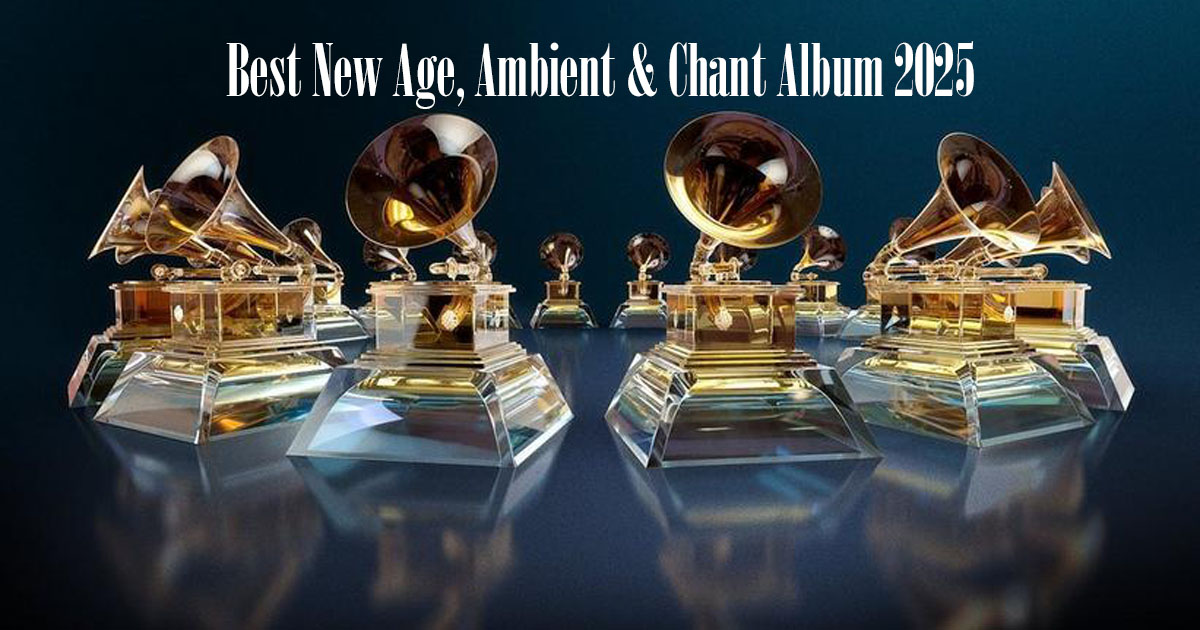 In the Best New Age, Ambient, Chant, Whatever-the-Fuck Album Category the nominees are:
In the Best New Age, Ambient, Chant, Whatever-the-Fuck Album Category the nominees are:
Best New Age, Ambient, or Chant Album
Break of Dawn — Ricky Kej
Triveni — Wouter Kellerman, Éru Matsumoto & Chandrika Tandon
Visions Of Sounds De Luxe — Chris Redding
Opus — Ryuichi Sakamoto
Chapter II: How Dark It Is Before Dawn — Anoushka Shankar
Warriors Of Light — Radhika Vekaria
The what-ever-the-fuck was as true this year as many others, but after the initial shock of totally inappropriate nominees like Chris Redding and inconsequential ones like Radhika Vekaria, my reaction became more calibrated.
Why The New Age etc. category can never get it even close to right is an unending mystery to me. Every year is full of inconsequential, unknown, downright godawful or absolutely in-the-wrong-category nominees. And this year has one of the most egregiously wrong nominees ever. I’m saving the worst for last. It seems that the New Age, Ambient, Chant category committees and voters do not know what those genres mean, do not know the difference between art and artifice, or are simply corrupt.
Except for one glaring exception, the music in this year’s NAAC nominees is not bad. They just don’t really represent the category which the Recording Academy describes as “ambient, exploratory, journey-like, and welcoming dissonance and consonance.” (See complete rules here.)
There is one album that is close to ambient and surprisingly, from one of the most unlikely sources. There is one and a half albums that might be New Age and one that might be chant and one that purports to be chant. So I guess they covered the stylistic spread, but. . .
While many feared that André 3000’s New Blue Sun would get nominated in New Age and swamp the category, it is Indians instead who dominate it, with South Asians appearing in 4 out of 6 nominations.
 Among them is Anoushka Shankar, the immensely talented and musically wide-ranging Indian-American sitarist. Despite being raised in a strict classical tradition by her father, Ravi Shankar, she has, like her father, always been exploratory in her approach. Chapter II: How Dark It Is Before Dawn, is the second EP exploring a sound that is more ambient than anything she’s done before, especially the track “Offering,” a pure electronic drone piece with sitar accents. Co-composed with British film composer and producer Peter Raeburn, the album is meditative, but not somnambulant, with tracks ranging from more traditional raga modes to more exotic extrapolations. This should probably have been in the Global Music category, but I am happy to welcome it in New Age and Ambient.
Among them is Anoushka Shankar, the immensely talented and musically wide-ranging Indian-American sitarist. Despite being raised in a strict classical tradition by her father, Ravi Shankar, she has, like her father, always been exploratory in her approach. Chapter II: How Dark It Is Before Dawn, is the second EP exploring a sound that is more ambient than anything she’s done before, especially the track “Offering,” a pure electronic drone piece with sitar accents. Co-composed with British film composer and producer Peter Raeburn, the album is meditative, but not somnambulant, with tracks ranging from more traditional raga modes to more exotic extrapolations. This should probably have been in the Global Music category, but I am happy to welcome it in New Age and Ambient.
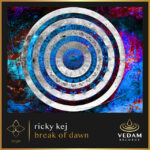 Also coming in on the South Asian side is Ricky Kej. He is a prolific composer who has won three Grammys, two for the album, Divine Tides, his collaboration with Stewart Copeland. He won in the New Age category as well as the Immersive Audio category. So it’s no surprise that his latest album, a lushly layered, Indian-motif-drenched recording, Break of Dawn, is here. Like Shankar’s EP, Kej’s album could easily be in the Global Music category, but I am sure that the deep melodicism and electronic arrangements kept him out of there. But he, like Anoushka, is welcome in the New Age Category.
Also coming in on the South Asian side is Ricky Kej. He is a prolific composer who has won three Grammys, two for the album, Divine Tides, his collaboration with Stewart Copeland. He won in the New Age category as well as the Immersive Audio category. So it’s no surprise that his latest album, a lushly layered, Indian-motif-drenched recording, Break of Dawn, is here. Like Shankar’s EP, Kej’s album could easily be in the Global Music category, but I am sure that the deep melodicism and electronic arrangements kept him out of there. But he, like Anoushka, is welcome in the New Age Category.
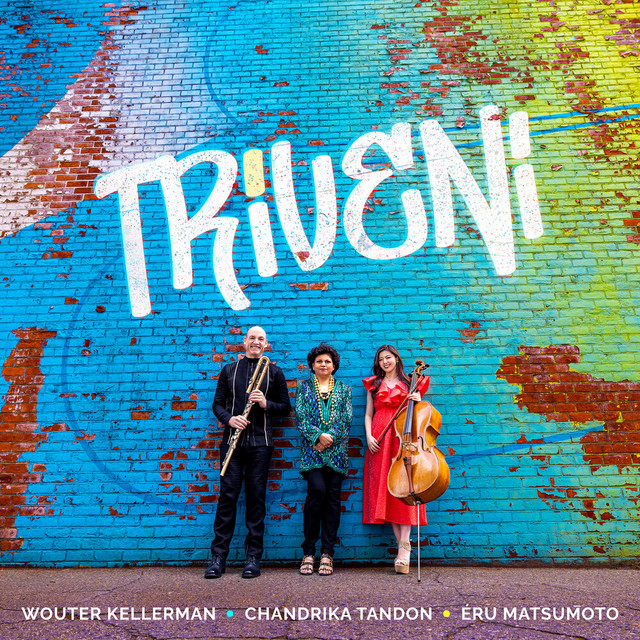 Ricky Kej’s other New Age Grammy was in 2015 for the album Winds of Samsara, a collaboration with South African flute player, Wouter Kellerman. Kellerman has his own entry this year, Triveni. While Kellerman is not Indian, one of his collaborators is: Indian-American singer Chandrika Tandon. Rounding out the trio is Japanese cellist Éru Matsumoto. Triveni is Sanskrit word for “where three rivers meet” and they converge on a sound that is an acoustic world fusion chamber music. Indian, African and western motifs weave in and out in gently undulating songs. Kellerman is a phenomenal flute player on multiple variations of the instrument. Again, it probably should be in Global music, but Kellerman has won in New Age before, so why not.
Ricky Kej’s other New Age Grammy was in 2015 for the album Winds of Samsara, a collaboration with South African flute player, Wouter Kellerman. Kellerman has his own entry this year, Triveni. While Kellerman is not Indian, one of his collaborators is: Indian-American singer Chandrika Tandon. Rounding out the trio is Japanese cellist Éru Matsumoto. Triveni is Sanskrit word for “where three rivers meet” and they converge on a sound that is an acoustic world fusion chamber music. Indian, African and western motifs weave in and out in gently undulating songs. Kellerman is a phenomenal flute player on multiple variations of the instrument. Again, it probably should be in Global music, but Kellerman has won in New Age before, so why not.
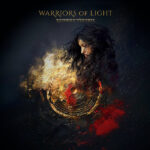 The final South Asian artist is Indian singer Radhika Vekaria, although her bio claims Indian, East African, and British roots. You may not have heard of her. I hadn’t, but she claims to have worked with Prince, Eddie Palmieri, Arman Van Buuren and more. Her album, Warriors of Light, falls into the chant part of the category on a nicely produced album that moves from more traditional straight chant performances like “Hanuman Chalisa”, sung a cappella against a tamboura drone and some very faint ambient flute touches, and “Liberate”, a middle of the road pop song. It’s not a bad album, but it doesn’t rise to the height of a Grammy nomination, and again, why isn’t this in global music?
The final South Asian artist is Indian singer Radhika Vekaria, although her bio claims Indian, East African, and British roots. You may not have heard of her. I hadn’t, but she claims to have worked with Prince, Eddie Palmieri, Arman Van Buuren and more. Her album, Warriors of Light, falls into the chant part of the category on a nicely produced album that moves from more traditional straight chant performances like “Hanuman Chalisa”, sung a cappella against a tamboura drone and some very faint ambient flute touches, and “Liberate”, a middle of the road pop song. It’s not a bad album, but it doesn’t rise to the height of a Grammy nomination, and again, why isn’t this in global music?
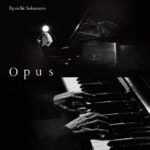 Heading to East Asia, the late composer and pianist Ryuichi Sakamoto has an album called Opus in the mix. It’s the soundtrack to the film, Opus, consisting of live recordings of Sakamoto recorded at NHK Studios in Tokyo. It is pure solo piano that an ailing Sakamoto recorded, just months prior to his death from cancer, which he knew was coming. It’s his last performance. He assays music from across his career, including tunes by Yellow Magic Orchestra and the ubiquitous “Merry Christmas, Mr. Lawrence.” These are performed with intimate austerity, almost all played as slowly and simply as they have ever been. It’s as if Sakamoto were pondering every note he’s made in his life. As someone who has sat six feet from Ryuichi while he was playing two Echoes Concerts, it is the barest I’ve ever heard him. It is a fragile, yet emotionally pitch-perfect album, but its stark severity makes it hard to listen to straight through. Opus is far from New Age and certainly not ambient or chant. This should have been in a classical category because Sakamoto was making 20th & 21st century classical music.
Heading to East Asia, the late composer and pianist Ryuichi Sakamoto has an album called Opus in the mix. It’s the soundtrack to the film, Opus, consisting of live recordings of Sakamoto recorded at NHK Studios in Tokyo. It is pure solo piano that an ailing Sakamoto recorded, just months prior to his death from cancer, which he knew was coming. It’s his last performance. He assays music from across his career, including tunes by Yellow Magic Orchestra and the ubiquitous “Merry Christmas, Mr. Lawrence.” These are performed with intimate austerity, almost all played as slowly and simply as they have ever been. It’s as if Sakamoto were pondering every note he’s made in his life. As someone who has sat six feet from Ryuichi while he was playing two Echoes Concerts, it is the barest I’ve ever heard him. It is a fragile, yet emotionally pitch-perfect album, but its stark severity makes it hard to listen to straight through. Opus is far from New Age and certainly not ambient or chant. This should have been in a classical category because Sakamoto was making 20th & 21st century classical music.
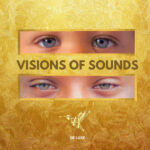
That brings us to the WTF section of the show. How Chris Redding got beyond the Grammy Selection Committee, let alone the nominating committee is a mystery wrapped up in manipulation. Yeah, I’m calling out these committees who have missed the boat on too many occasions. Redding’s PR calls his music “ambient chant”, but Visions of Sound is pure R&B/Hip-Hop dressed in chopped-up rhythms and rhymes. It has zero reason being here and it isn’t very good even at that. Redding claims to be an award-winning musician and producer but I could not find a single award attributed to him. He could’ve won something for his good work in neurodiversity, but I didn’t see that either. His main calling card seems to be a panoply of neurological disorders including his own ADHD, Dyslexia, Synesthesia and his son’s Autism. But I have to tell you, that’s not so special. Half the artists I interview, especially Gen-Xers and Millennials, claim to have at least one of the first three ailments.
But here’s the capper. The album, Visions of Sounds Deluxe is not even eligible to be entered. Redding’s album Visions of Sound, came out in early 2023 and was submitted for the Grammys at that time. The album Visions of Sound Deluxe is the EXACT SAME ALBUM, but with 35-second intro added. That clearly violates Academy Rules that only New Recordings may be submitted in the non-historical categories.
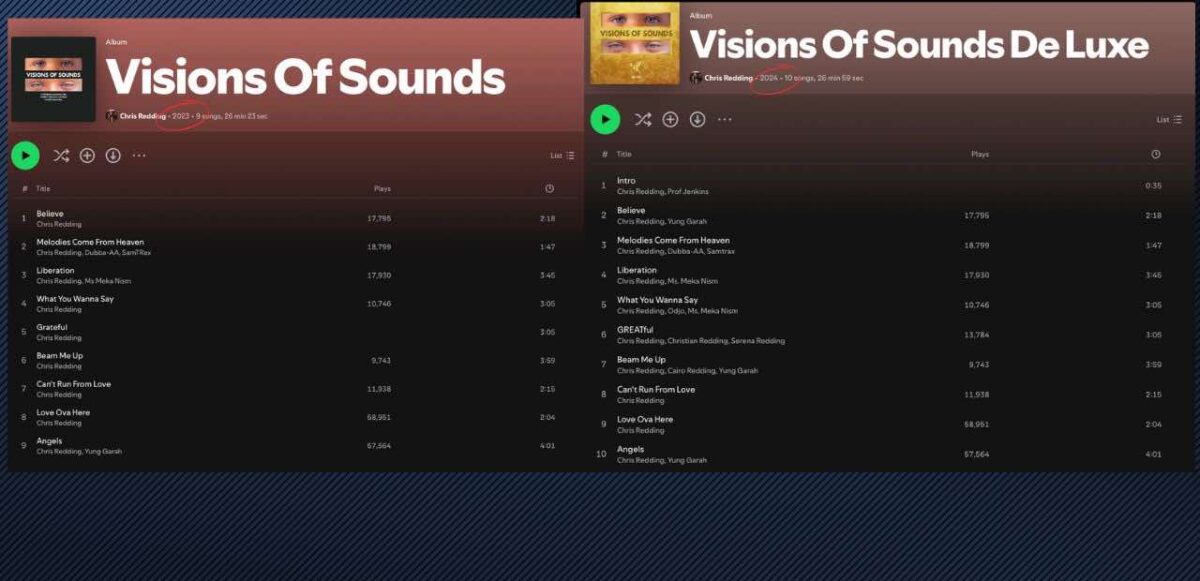
If Chris Redding wins this award, The Grammys and the NAAC Committees and the Recording Academy have a lot to answer for.
 As I mentioned earlier, many thought that André 3000’s ambient new age improvisational album, New Blue Sun, would overrun the category due to his popularity and reputation with the hip-hop group Outkast. And indeed, the album, which was dominated by his many flutes, was more purely new age and ambient than anything nominated this year. But instead of the NAAC category, New Blue Sun is in the Jazz category with Robert Glasper, Meshell Ndegeocello, Arooj Aftab and Keyon Harrold. To top that off, New Blue Sun is strangely nominated for album of the year alongside records by Beyoncé, Billie Eilish. Charlie XCX, Taylor Swift, Chappell Roan and Jacob Collier.
As I mentioned earlier, many thought that André 3000’s ambient new age improvisational album, New Blue Sun, would overrun the category due to his popularity and reputation with the hip-hop group Outkast. And indeed, the album, which was dominated by his many flutes, was more purely new age and ambient than anything nominated this year. But instead of the NAAC category, New Blue Sun is in the Jazz category with Robert Glasper, Meshell Ndegeocello, Arooj Aftab and Keyon Harrold. To top that off, New Blue Sun is strangely nominated for album of the year alongside records by Beyoncé, Billie Eilish. Charlie XCX, Taylor Swift, Chappell Roan and Jacob Collier.
Given that, it would have been so good for it to be in the NAAC category, drawing attention to other music there. It’s not a great album. It’s half-baked. The improvisations are unfocused and not very intuitive, and the overall effect is muddy and vague. But unlike any of the other artists nominated, it would’ve brought more widespread attention to the category and maybe, the best music it represents.
This week there are weightier things to consider than the Grammys, in any category, where a bad winner won’t have nearly the consequences of the election. If the winner is a bad record, it will be forgotten, like Yusef Lateef’s Little Symphony (1988), Jack DeJohnette’s Peace Time (2009), Omar Akram’s Echoes of Love (2013), Laura Sullivan’s Love’s River (2014), and Carla Patuto’s So She Howls (2023). (The latter not a bad record, just in the wrong category.) Whereas other wins in the real world have much more lasting consequences.
The New Age, Ambient and Chant category remains a mess and the various Electronic Music categories and Contemporary Instrumental category, where a lot of this music could go, shut it out in favor of what are essentially pop and jazz records respectively.
So the Grammys are mess all over, and the NAAC is the messiest of them all. but they are what we have.

Interesting read. We are a funny people.
Chris Redding’s entry is also plainly ineligible, as it is a reissue of the same album he entered last year in the 66th Awards. How this was not vetted speaks again to the disorganisation of the RA.
Yes, it is.
Man, what a mess that category is! I think I’ll enjoy the Anoushka Shankar record, so I need to give a listen.
And I completely agree about Andre 3000 – I enjoy it in small doses, but it’s not a strong record overall. Still, kudos to him for trying something completely different.
Agree on all counts. The Wouter Kellerman and Ricky Kej albums are very good as well.
NAAC is not the only mess this year, or any other year. Taking a look at Global this year, one can see how some entries are just pure jokes! Very insightful article, John. Some need to speak up and you did.
Brilliant and insightful. Really enjoyed your thoughtfulness and perspective, John. Going back to Yusef Lateef in 1988, who at least had the integrity to ask, “Why did they give me a Grammy? I’m a jazz player, not New Age. I don’t know what that even means.” What I’ve seen and been told since then
has been a long standing desire to abolish the words New Age from the category entirely. When that was rebuffed, they just added two more categories to dilute any possible deserving New Age album’s chances of winning. Plus, and someone should really look into this. As you point out with Redding’s album, even though the new rules state that an album must have 75% new music, his album has less than 1 %. But here’s the other factor most folks don’t know: Radhika is now part of Grammy staff. Could there be some insider trading going on that gave her album a nomination over other more deserving albums? Several years ago, the South Indian invasion of New Age began in earnest, with a
classical vocalist who submitted to this category instead of the obvious, already existing one. Maybe they figure they have a better chance of winning in the NAAC world. If I were a betting man, I’d bet
that the words New Age are removed entirely in the near future, in the same way that the history of slavery has been taken out of many school books. ( For the record: there are TWO Posthumous albums featuring David Darling. The other one is “Adagio for Strings and Soul” produced by Steven Halpern.
It’s more New Age than any of the nominees, in many people’s opinion.)
This claim about Radhika Vekaria is completely false. And made anonymously???? Shameful! Radhika is not part of Grammy staff, and her album is absolutely brilliant and deserving of it’s nomination.
But, You just replied anonymously.
What you said … ditto “
I would do some research on how many formerly released albums have been reentered in any category. The rule is that if you re-release remastered album and add new songs, you can submit the album. I know an artist and a group that have done so and won a Grammy for the same album
I agree the whole category is completely messed up
Great article.
Very disappointed in this years New Age Nominations. Terrible.
Agree with your article. Most of the nominees should be in the “Global” cateogory except for Anoushka Shankar. Very tired of seeing the Recording Academy Voters nominate Ricky Kej. Also, it looks like in addition to Rashida, Chris Redding, works on the staff of The Grammys if you research further. Definitely must assume that these nominations are rigged. Thank you for doing this article, someone needs to speak the truth.
Thanks. A least Redding got removed from the nominees, albeit on a technicality.
Really? How did you find out Redding got removed?
The Academy announced it on their news page
I am a lifetime voting member of the Recording Academy, and I so disappointed with the outright false claims, innuendo and accusatory comments made in response to your article. Radhika Vekaria is NOT a part of Grammy staff. She is a brilliant, well-intentioned, hard-working chant artist. She blew me away with her singing, playing and loving HEART the first time I saw her perform 3 years ago. If you actually listen to her new album, “Warriors of Light,” rather than read irrelevant reviews, you can decide for yourself. https://www.radhikavekaria.com/warriorsoflightfyc
I think what the article is expressing is that Radhika’s album feels inconsequential compared to the other nominations. I am a long time voting member and it seems as though Radhika had a big party to promote her album and invited all the voting members she could. In addition, she emailed voters constantly to vote for her. There should be rules that artists can not host parties with drinks/food persuading voters. It should be solely about listening to the music. The academy needs to eliminate any nominations where artists bribe voters. Artists who aren’t at a level of “grammy” quality are essentially buying their nominations. If you are reading this and are a voter, you can hop on facebook and see all the party photos tagged, it’s all the same voters, same group of people. Who is to say that Radhika’s nomination or other nominations might be because of this group of party goers (who are voters) that did some sort of “block” voting. I’m reluctant to assume this, but this is what it clearly looks like from the outside.
I’m a lifetime member, former two-term trustee, LA board member, and chapter V.P. I remember winning my Grammy and three nominations in the 80s. Absolutely zero self-promotion was allowed, and one got disqualified if you broke the rules. That said, from your perspective, I understand what you mean about the parties. But is that any different or worse than what major labels do?
It’s the same as paying radio to play your music, or fake spotify streams…. major labels spend the money to get the awards for their artists…. now independent artists spend thousands to persuade voters by having parties to ask voters to vote for them. It’s not about the music with The Grammys, it’s about buying the gold little trophy….. from your perspective…. why do artists feel the determination to win a Grammy? I think it’s their ego and wanting approval as grown adults. True music artists don’t run around begging people for votes. Btw, congrats on your achievements in the 80’s, you won the real way, which is only achieved these days by the 1%. Will you share your name?
I don’t understand why a new New Age category even exist from the start. New Age is esoteric stuff. Not judging, but how does it relate to music and why do they put random artist in them ? Anoushka Shankar, which is amazing, should have been in indian music category or ambient. I don’t think a “spiritual” category is needed, at all.